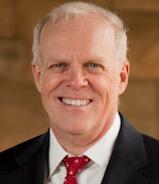
John L. Hennessy grew up in New York, earning a degree in electrical engineering from Villanova University, and then attending Stony Brook University, where he earned a Ph.D. in computer science in 1977. Hennessy started as a Stanford University faculty member in 1977 and served as President of Stanford from 2000 to 2016.
In his early career, Hennessy made myriad impactful contributions in computer science research and education. Hennessy has received acclaim for, among other things, his work on reduced instruction set computer (RISC) processors, his work on high-performing cache hierarchies and his work on the Stanford FLASH multiprocessor. In 2017, Hennessy won the A. M. Turing Award, generally considered to be the top honor for researchers in computer science, for his work on RISC processors, which are included in 99% of new computer chips. Hennessy also received the Institute of Electrical and Electronics Engineers’ Medal of Honor in 2012 for this pioneering work.
In addition, Hennessy has made important contributions to computer science education. His two textbooks, Computer Organization and Design: the Hardware/Software Interface and Computer Architecture: A Quantitative Approach, have been used prominently in graduate and undergraduate computer science classes since the early 1990s. Prior to his time as president of Stanford, Hennessy served as the director of Stanford’s Computer System Laboratory, as chair of the Department of Computer Science, dean of the School of Engineering, and as provost.
As President of Stanford, one of Hennessy’s key objectives was to increase the affordability of and access to higher education. During his tenure, Stanford’s financial aid system became one of the strongest in the world. His tireless work brought immense benefits to students across many levels and types of education, from the arts to the sciences and from undergraduate to graduate students. One of Hennessy’s signature legacy programs is the Knight-Hennessy Scholars program, which began in 2016 and has a $750 million endowment to fully fund graduate students across all disciplines at Stanford.
Hennessy has also had important impacts in directly translating his expertise into the business world. He has served on the boards of Atheros Communications and Cisco Systems and currently serves as chairman of the Board for Alphabet Inc. He has strengthened links between the business and academic communities in a manner that fosters intellectual growth and preserves academic independence.
Hennessy is also an elected member or Fellow of the National Academy of Engineering, the Royal Academy of Engineering, The National Academy of Science, the American Academy of Arts and Sciences, and the American Philosophical Society. He has been awarded the Carnegie Academic Leadership Award, the Morris Chang Exemplary Leadership Award, and the John van Neumann Medal.


